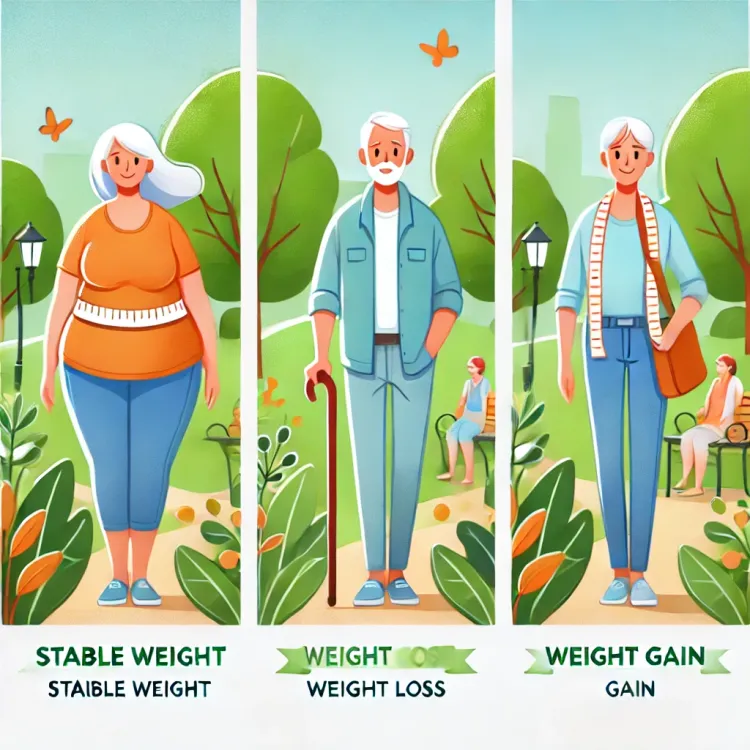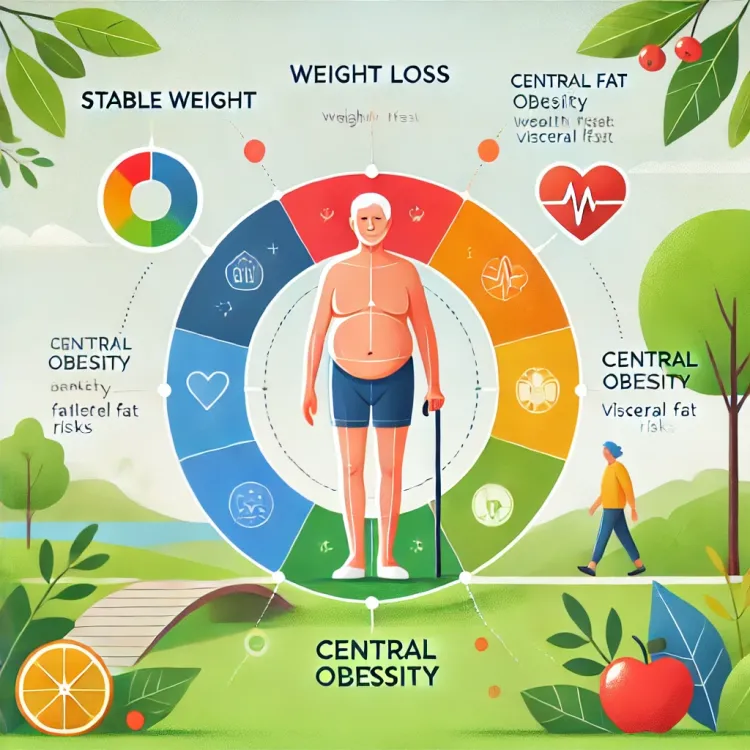The popular saying “You can’t put a price on being lean in old age” has long been a common belief among those seeking health and longevity. Many people assume that, for older adults, the lighter the weight, the better.
However, focusing solely on weight loss may not be the healthiest approach for older adults. Instead, maintaining a stable weight over time can often be a more effective strategy for longevity and overall well-being. A 2023 study published in The Journal of Gerontology supports this view. It found that older adults who maintained a stable weight were more likely to live longer than those whose weight decreased by more than 5%.
This study, involving over 50,000 women aged 61 to 81, analyzed the relationship between weight changes and reaching ages 90, 95, or even 100. Weight measurements were recorded at the beginning of the study, the third year, and the tenth year, with participants classified into three groups:
- Weight Loss: A decrease of 5% or more
- Weight Gain: An increase of 5% or more
- Stable Weight: Changes within 5%

The findings revealed that those who maintained a stable weight were more likely to live longer:
- 3-Year Weight Loss Impact: Compared to those with stable weight, participants who lost 5% or more over three years had a 33% lower chance of reaching age 90, a 35% lower chance of reaching age 95, and a 38% lower chance of reaching age 100.
- 10-Year Weight Loss Impact: Participants who lost 5% or more over ten years were 40% less likely to reach age 90 and 49% less likely to reach age 95, compared to those with stable weight.
- Longevity Advantage: Women with stable weight were 1.2 to 2 times more likely to live to ages 90-100 compared to those with significant weight loss.
In short, while being “lean” sounds appealing, it does not necessarily translate to “living long.” For older adults, stable weight management is more crucial than persistent weight loss.

Key Points for Older Adults: Why Stability Over Slimness Matters
Stable weight in older adults is often associated with balanced nutrition and healthier lifestyle habits. Those who maintain a stable weight likely consume a balanced diet, engage in regular physical activity, and manage their health proactively. Metabolism naturally slows with age, making weight stability harder to achieve, so establishing good habits in one’s 40s or 50s is wise.
People often fixate on total body weight, but central (abdominal) obesity is a more significant health risk than general obesity. Dr. Sui Di explains, “The belly fat in ‘big bellies’ includes both subcutaneous and visceral fat. While visceral fat cushions organs, excessive fat deposits can infiltrate organs, leading to conditions like fatty liver and compromised heart, artery, and pancreatic function.”

Six Ways for Older Adults to Maintain a Stable, Healthy Weight
- Diversify Your Diet: Aim for a balanced diet rich in variety. Include vegetables, lean meats, fruits, nuts, and whole grains, ideally consuming 12 different foods daily and 25 types weekly. Limit high-fat, high-salt, and high-sugar foods, and drink plenty of water.
- Prioritize High-Quality Protein: With age, muscle mass declines, leading to frailty. Protein, essential for muscle synthesis, should be a staple in your diet. Older adults should focus on high-quality protein sources like dairy, eggs, lean meat, poultry, fish, and soy products.
- Don’t Shun Salt and Oil: A balanced intake of salt and oils supports digestion and nutrition. Healthy fats are essential and may even have cancer-preventive benefits. Use 25–30 grams of oil daily, opting for plant-based oils, and limit salt intake to 5 grams (4 grams if managing hypertension).
- Engage in Regular Exercise: Daily physical activity is beneficial at any age, particularly for older adults. Aim to get outside on good weather days, but pace yourself to avoid overexertion.
- Practice Good Sleep Habits: Consistent sleep quality is vital for well-being. Most adults need 7–8 hours of sleep for optimal alertness and energy.
- Track Your Weight Regularly: Establish a routine to weigh yourself weekly, helping to monitor any changes and make timely adjustments if needed.
Maintaining a stable weight is a simple yet powerful goal that could significantly impact health and longevity in older adults. Rather than striving for a slim figure, focus on consistency and a balanced, sustainable lifestyle.
References:
- Harvard Health discusses the importance of maintaining a stable weight in older adults and provides insights into healthy weight management strategies. They emphasize that weight stability is crucial for overall health and longevity1.
- National Center for Equitable Care for Elders provides a comprehensive guide on weight management planning for older adults. This guide highlights the importance of a balanced diet, regular physical activity, and proper nutritional intake to maintain a healthy weight and prevent malnutrition2.
- Harvard Medical School has conducted studies on the impact of eating habits on weight and health. Their research indicates that maintaining a stable weight through healthy eating and regular exercise is essential for preventing obesity and related health issues3.
Disclaimer:
The information in this article is for general information sharing purposes only. It is not a substitute for personalized medical or dietary advice. For personal health concerns and dietary needs, consult a qualified health care provider or dietitian.

